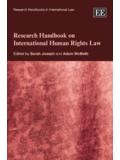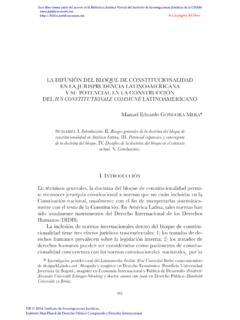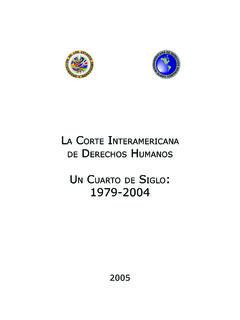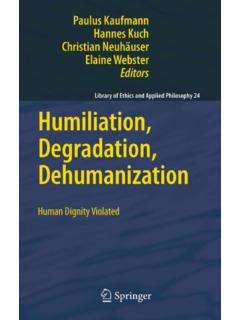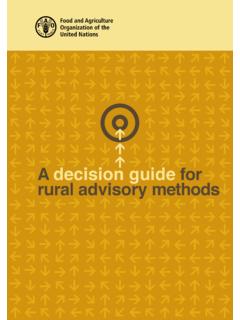Transcription of INTER-AMERICAN COURT OF HUMAN RIGHTS ADVISORY …
1 INTER-AMERICAN COURT OF HUMAN RIGHTS ADVISORY opinion OC-16/99 OF OCTOBER 1, 1999 REQUESTED BY THE UNITED MEXICAN STATES THE RIGHT TO INFORMATION ON CONSULAR ASSISTANCE IN THE FRAMEWORK OF THE GUARANTEES OF THE DUE PROCESS OF LAW Present: Ant nio A. Can ado Trindade, President; M ximo Pacheco-G mez, Vice-President; Hern n Salgado-Pesantes, Judge; Oliver Jackman, Judge; Alirio Abreu-Burelli, Judge; Sergio Garc a-Ram rez, Judge, and Carlos Vicente de Roux-Rengifo, Judge.
2 Also present: Manuel E. Ventura-Robles, Secretary, and Renzo Pomi, Deputy Secretary. THE COURT , composed as above, renders the following ADVISORY opinion : I SUBMISSION OF THE REQUEST 1. By submission of December 9, 1997, the United Mexican States (hereinafter Mexico or the requesting State ) sought an ADVISORY opinion of the INTER-AMERICAN COURT of HUMAN RIGHTS (hereinafter the INTER-AMERICAN COURT , the COURT , or the Tribunal ) on several treaties concerning the protection of HUMAN RIGHTS in the American States (hereinafter the request ).
3 According to the requesting State, the application concerned the issue of minimum judicial guarantees and the requirement of the due process when a COURT sentences to death foreign nationals whom the host State has not informed of their right to communicate with and seek assistance from the consular authorities of the State of which they are nationals. 2. Mexico added that the request, made pursuant to Article 64(1) of the American Convention on HUMAN RIGHTS (hereinafter the American Convention or Pact of San Jos ), came about as a result of the bilateral representations that the 2 Government of Mexico had made on behalf of some of its nationals, whom the host State had allegedly not informed of their right to communicate with Mexican consular authorities and who had been sentenced to death in ten states in the United States.
4 3. The requesting State asserted that the considerations giving rise to the request were the following: the sending State and the host State were both parties to the Vienna Convention on Consular Relations; both were members of the Organization of American States (hereinafter the OAS ) and had signed the American Declaration of the RIGHTS and Duties of Man (hereinafter the American Declaration ); and although the host State had not ratified the American Convention, it had ratified the International Covenant on Civil and Political RIGHTS of the United Nations (hereinafter the UN ).
5 4. Given these considerations, Mexico requested the COURT s opinion as to the following points: In relation to the Vienna Convention on Consular Relations: 1. Under Article 64(1) of the American Convention, should Article 36 of the Vienna Convention [on Consular Relations] be interpreted as containing provisions concerning the protection of HUMAN RIGHTS in the American States? 2. From the point of view of international law, is the enforceability of individual RIGHTS conferred on foreigners by the above-mentioned Article 36 on behalf of the interested parties in regard to the host State subject to the protests of the State of which they are nationals?
6 3. Mindful of the object and purpose of Article 36(1)(b) of the Vienna Convention, should the expression without delay contained in that provision be interpreted as requiring the authorities of the host State to inform any foreigner detained for crimes punishable by the death penalty of the RIGHTS conferred on him by Article 36(1)(b), at the time of the arrest, and in any case before the accused makes any statement or confession to the police or judicial authorities? 4. From the point of view of international law and with regard to aliens, what should be the juridical consequences of the imposition and application of the death penalty in the light of failure to give the notification referred to in Article 36(1)(b) of the Vienna Convention?
7 Concerning the International Covenant on Civil and Political RIGHTS : 5. In connection with Article 64(1) of the American Convention, are Articles 2, 6, 14 and 50 of the Covenant to be interpreted as containing provisions concerning the protection of HUMAN RIGHTS in the American States? 6. In connection with Article 14 of the Covenant, should it be applied and interpreted in the light of the expression all possible safeguards to ensure a fair trial contained in paragraph 5 of the United Nations Safeguards guaranteeing protection of the RIGHTS of those facing the death penalty, and that concerning foreign defendants or persons convicted of crimes subject to capital punishment that expression includes immediate notification of the detainee or defendant, on the part of the host State.
8 Of RIGHTS conferred on him by Article 36(1)(b) of the Vienna Convention? 7. As regards aliens accused of or charged with crimes subject to the death penalty, is the host State's failure to notify the person involved as required by Article 36(1)(b) of the Vienna Convention in keeping with their RIGHTS to adequate time and facilities for the preparation of his defense , pursuant to Article 14(3)(b) of the Covenant? 8. As regards aliens accused of or charged with crimes subject to the death penalty, should the term minimum guarantees contained in Article 14(3) of the Covenant, and the term at least equal contained in paragraph 5 of the corresponding 3 United Nations Safeguards be interpreted as exempting the host State from immediate compliance with the provisions of Article 36(1)(b) of the Vienna Convention on behalf of the detained person or defendant?
9 9. With regard to [A]merican countries constituted as federal States which are Parties to the Covenant on Civil and Political RIGHTS , and within the framework of Articles 2, 6, 14 and 50 of the Covenant, are those States obliged to ensure the timely notification referred to in Article 36(1)(b) to every individual of foreign nationality who is arrested, detained or indicted in its territory for crimes subject to the death penalty; and to adopt provisions in keeping with their domestic law to give effect in such cases to the timely notification referred to in this article in all its component parts, if this was not guaranteed by legislative or other provisions, in order to give full effect to the corresponding RIGHTS and guarantees enshrined in the Covenant?
10 10. In connection with the Covenant and with regard to persons of foreign nationality, what should be the juridical consequences of the imposition and application of the death penalty in the light of failure to give the notification referred to in Article 36(1)(b) of the Vienna Convention? Concerning the OAS Charter and the American Declaration 11. With regard to the arrest and detention of aliens for crimes punishable by death and in the framework of Article 3(1)1 of the Charter and Article II of the Declaration, is failure to notify the detainee or defendant immediately of the RIGHTS conferred on him in Article 36(1)(b) of the Vienna Convention compatible with the Charter of HUMAN RIGHTS , which contains the term without distinction of nationality, and with the right to equality before the law without distinction as to any factor, as enshrined in the Declaration?
